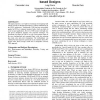Free Online Productivity Tools
i2Speak
i2Symbol
i2OCR
iTex2Img
iWeb2Print
iWeb2Shot
i2Type
iPdf2Split
iPdf2Merge
i2Bopomofo
i2Arabic
i2Style
i2Image
i2PDF
iLatex2Rtf
Sci2ools
105
click to vote
FPGA
2003
ACM
2003
ACM
Reducing pin and area overhead in fault-tolerant FPGA-based designs
This paper proposes a new high-level technique for designing fault tolerant systems in SRAM-based FPGAs, without modifications in the FPGA architecture. Traditionally, TMR has been successfully applied in FPGAs to mitigate transient faults, which are likely to occur in space applications. However, TMR comes with high area and power dissipation penalties. The proposed technique was specifically developed for FPGAs to cope with transient faults in the user combinational and sequential logic, while also reducing pin count, area and power dissipation. The methodology was validated by fault injection experiments in an emulation board. We present some fault coverage results and a comparison with the TMR approach. Categories and Subject Descriptors B.8.1 [Performance and Reliability]: Reliability, Testing, and Fault-Tolerance General Terms Design, Performance, Reliability. Keywords Fault-tolerance, FPGA.
Related Content
| Added | 06 Jul 2010 |
| Updated | 06 Jul 2010 |
| Type | Conference |
| Year | 2003 |
| Where | FPGA |
| Authors | Fernanda Lima, Luigi Carro, Ricardo Augusto da Luz Reis |
Comments (0)

